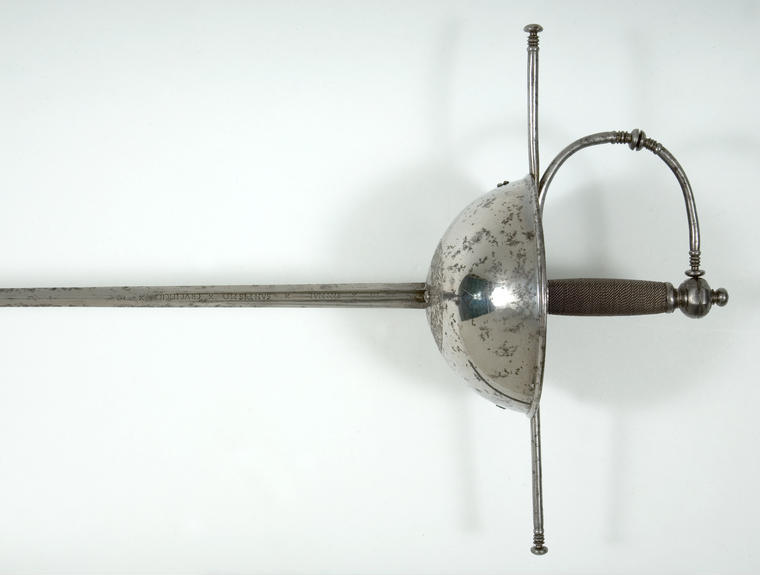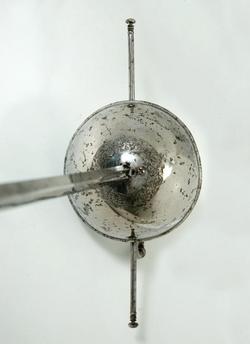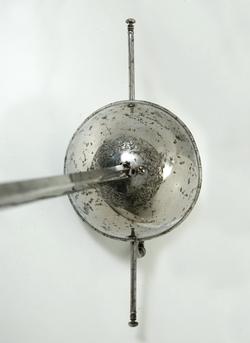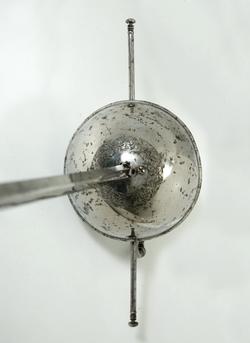Awaiting location update
Maker(s)
Production:
Unknown
(Possibly)
Entities
Categories
Description
Rapier. Small button-like pommel, with a large well-formed tang-button. Wire-bound grip of oval section swelling slightly in the middle with plain steel collars top and bottom. Strongly arched knuckle-guard of circular section, the top end fashioned as a button-shaped knob of the same form as the pommel; at the midpoint are two opposed flat button-shaped elements with sharp ridges on either side. Long straight quillons, also of circular section, the tips finished en suite with the knuckle-guard. Deep cup-guard, decorated with a circular pattern of scrolling leaves around the bottom of the half-globe, where the blade enters the cup. This cup-guard is fastened to the branches with a screw on either side of the hole through which the blade passes. This hole is rectangular, with one each of the longer sides (in the plane of the blade) a small cutout to accommodate a long narrow steel spike protruding from the top of the scabbard. Inside the cup is a finely-wrought garda polvo, in the form of a solid circular plate with a pattern of scrolling leaves chiselled in relief, edged with a kind of frill of lace-like elements pressed à jour. Instead of true branches, a narrow steel rib runs upward from the Garda Polvo to the point where the quillons cross the top of the cup. The ribs are chiselled in a zig-zag pattern and terminate in circular shell-like plates above trefoils. Blade of very strong triangular section with a deep narrow fuller at the forte. This is inscribed, on the obverse XX MI SINNAL X SANTISMO X CRUCIFICIO XX' followed by a small mark, and on the reverse 'XX ENRIQUE COLL X ESPADERO X IN X ALAMANIA X.'
Scabbard of wood covered with leather. At the top, a steel locket underneath the leather covering with a tubular fitment on the side to take a belt-hanger of steel. This consists of a D-shaped element with a long rod of circular section parallel with and below the upright of the D, which fits into the tube on the scabbard. Pivoted to the midpoint of the D is a short arm ending in a circular buckle. Small chape of plain steel finished with a double moulding and a knot.
Norman hilt type 100.
Notes
History note: Ximenes d’Aragena sale, Florence, 1902, No. 305; Baron C.A. de Cosson; sold Sotheby's, May 23 1946, Catalogue of Armour and Weapons from the Collection of the late Baron C.A. de Cosson, Sold by order of C.A. de Cosson, Esq. . . ., p. 13, lot 154; bought for the Fitzwilliam Museum
Legal notes
Given by the Friends of the Fitzwilliam Museum
Measurements and weight
Length: 111.5 cm
Acquisition and important dates
Method of acquisition: Given
(1946-12-23)
by
The Friends of the Fitzwilliam Museum
Dating
18th Century, Early
Production date:
circa
AD 1700
Note
Although quite plain, this is an exceptionally good example of its type; the hilt-hanger is very rarely found, and is an example of the way in which these cup-hilted Spanish/Italian rapiers were fastened to the waist-belt.
Spanish or Southern Italy
People, subjects and objects depicted
Components of the work
Grip
composed of
wire
Scabbard Locket
composed of
steel
Sword
composed of
steel
Scabbard
composed of
leather
Quillons
Length 30.7 cm
Blade
Length 98.2 cm
Decoration
Inscription or legends present
- Text: XX MI SINNAL X SANTISMO X CRUCIFICIO X
- Location: On the blade, obverse
- Method of creation: Inscribed
- Type: Inscription
- Text: XX ENRIQUES COLL X ESPADERO IN ALAMANIA X
- Location: On blade, reverse
- Method of creation: Inscribed
- Type: Maker's name
References and bibliographic entries
Identification numbers
Accession number: M.13 & A-1946
Primary reference Number: 18983
Stable URI
Audit data
Created: Saturday 6 August 2011
Updated: Monday 29 April 2024
Last processed: Wednesday 14 May 2025
Associated departments & institutions
Owner or interested party:
The Fitzwilliam Museum
Associated department:
Applied Arts









